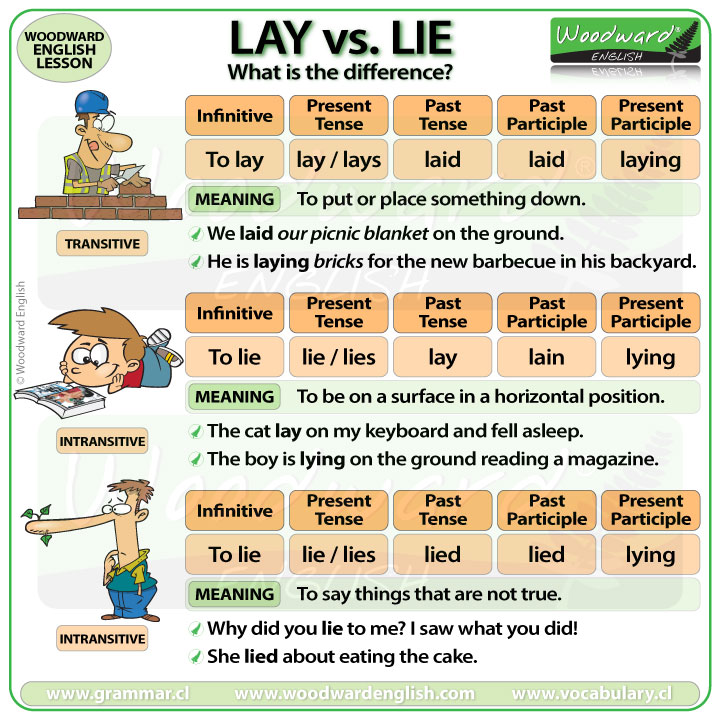Lay vs. Lie
Learn English Vocabulary
Lay and Lie are both verbs. However these verbs are frequently confused and misused, even by native speakers of English. Why? What is the difference between LAY and LIE?
Let’s look at the different meanings of each verb:
LAY
Here is the conjugation of the verb To Lay.
Present Tense: lay / lays
Past Tense: laid
Past Participle: laid
Present Participle: laying
Lay means to put or place something down.
Lay is a transitive verb. This means it has a direct object after it. We lay something.
- We laid our picnic blanket on the ground.
= Here it refers to putting or placing the blanket on the ground. - He is laying bricks for the new barbecue in the his backyard.
= This means he is placing the bricks one on top of the other. - I fell asleep as soon as I laid my head on the pillow.
= It happened as soon as I put my head on the pillow. - They are going to lay new carpet throughout the house.
= This means they are going to put new carpet…
Notice how we said what the thing or object is that we laid. We laid our picnic blanket, he is laying bricks, I laid my head…. lay new carpet…. we all laid something. You can see that we need an object after the verb to lay.
Lay also has a couple more meanings:
Did you know that birds lay eggs?
Yes, lay also means to produce an egg. This verb is most commonly used with birds such as hens or chickens.
- The hen laid an egg.
= The hen ‘produced’ an egg.
You can also lay a table which means to set a table or put plates, knives and forks etc. on a table.
- He had to lay the table before he could serve dinner.
This is the same as saying he had to set the table before he could serve dinner.
Now let’s look at the verb To Lie.
LIE
Here is the conjugation of the verb To Lie.
Present Tense: lie / lies
Past Tense: lay
Past Participle: lain
Present Participle: lying
Lie means to be (usually resting) on a surface in a horizontal position.
Lie is an intransitive verb. This means it never has a direct object (or a thing) after it. You cannot lie a thing. You lay a thing.
- He likes to lie in his hammock when it is a nice day.
- He lay on his towel so the sand wouldn’t stick to him.
- The cat lay on my keyboard and fell asleep.
- The boy is lying on the ground reading a magazine.
We often use the word DOWN after lie. In these previous sentences we could also include the word down after the verb lie. He lay down on his towel… The cat lay down on my keyboard etc.
Lie also has another meaning.
Here is the conjugation of the other meaning of the verb To Lie.
Present Tense: lie /lies
Past Tense: lied
Past Participle: lied
Present Participle: lying
Lie can also mean to say things that are NOT true. To NOT tell the truth.
- Why did you lie to me? I saw what you did!
- She lied about eating the cake.
- I don’t believe him because he has lied so many times.
- If you lie, your nose will grow.
Now, let’s look at the conjugation of these verbs together:

You will notice that the word LAY is the present tense of the verb To lay AND also the past tense of To lie. As you have already seen, the meanings are completely different though. Also the verb To Lie has two different forms of conjugation depending on its meaning.
You can probably now see why even native English speakers can get confused by these verbs.
Next Activity
Try our interactive game about the difference between lay, lie, laid, lain, lying and laying.
If you found this lesson interesting or useful, let others know about it.
